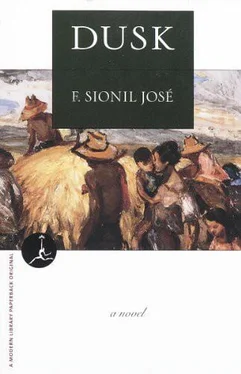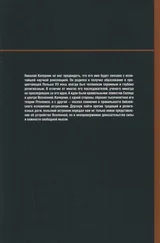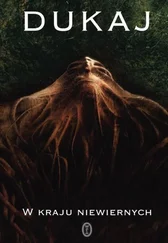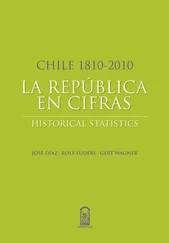“These Americans, this Thomas Collins, they do not understand. Or perhaps they don’t want to understand because what they really want is to subdue us. Still, I have to reply to such lies so that the world will know we are not cowards or immature children. Do you know that in one of his dispatches he said all Filipinos are thieves? Their soldiers camped in Manila told him this — that unless their supplies were well guarded, they would all be stolen by Filipinos. If so, then let it be! It is not thievery to steal from them — it is an act of war, and may Filipinos bleed them to death …”
“How long did the courier travel from Tarlak this time?” Don Jacinto asked.
“Less than a day’s ride,” the Cripple said. “So I really am not too late with the news—” The Cripple stopped and looked at Istak, who remained standing by the door, hearing everything.
“You can trust him, Apolinario,” Don Jacinto said quietly. “This is Eustaquio. He understood everything we said.”
Istak bowed and fumbled for words: “Good evening, Apo.” The familiar Spanish words flowed out finally.
Don Jacinto continued: “There is no doctor anywhere near but Eustaquio is very good. He has taken care of many people. If we have to have a doctor, we have to go to Tarlak.”
The Cripple shook his head. “The Americans will soon be there,” he said wanly.
Don Jacinto nodded. “Give him a chance to help you.”
“I do not have a choice,” the Cripple said, suddenly laughing, the pallid face instantly transformed. He was homely and dusky, with a narrow forehead, but the severity of his countenance was banished. He was just another man still in his youth, brimming with humor.
Don Jacinto left to arrange for their supper.
“I hope that my humble self can be of service to you, Apo,” Istak said in very polite Spanish and in the same obeisant tone with which he had always addressed Padre Jose.
The Cripple looked at him, then shook his head. “Do not speak to me in such a manner, Eustaquio. I am not old or venerable. Besides, I am really at your mercy.” He pointed to one of the rattan chairs close by. “And don’t stand there. Sit down.”
Istak took the proffered chair. Beside him was a porcelain washstand with a polished mirror, and close to the Cripple’s bed was another table piled with books, an inkstand, and sheets of paper. The man had been writing and Istak could see the careful script. Istak could still write as well as that, perhaps even better. He had taken pride in his penmanship but had not held a pen in a long time and had done whatever writing he had to do with a pencil.
“Tell me, Eustaquio,” the Cripple asked. “How is it that you speak Spanish so well?”
“I was an acolyte in the church of Cabugaw, señor. In the Ilokos.”
“Jacinto says you are a healer. How long have you been one?”
“About ten years now, Apo,” Istak said. “I learned a little from an old priest about medicinal plants. And, of course, with prayer and God’s help there is always hope.”
Silence. Then the Cripple spoke again: “I have been suffering for some time now. I have pains here,” he said, pressing his sides. “You cannot see it now because the pan has been emptied, but when I urinate it is very milky. And I perspire so much, as you can see.” He wiped his brow, which was moist even in the cool September evening.
His meal came in — the new rice still steaming and fragrant, salted eggs, a small dish with salted fish and sliced tomatoes, and dried meat which was fried.
Istak shook his head. The Cripple wanted to share the food with him but Istak demurred; he would take his meal with the servants in the kitchen after Don Jacinto and his family had eaten. He stood up; he had confirmed what he suspected. “I will go now, Apo,” he said. “I will come back shortly with your medicine.”
In the dining room, Don Jacinto had already sat down with his family to eat and a servant hovered by the table waving a paper wand to keep the flies away. “I will return in a short while, Apo,” Istak said.
He hurried down the deserted street, disturbing the stray dogs lying there. At the edge of the town, he looked at the saplings, then crossed the creek to the other side until he came to a young banaba tree. He could make out the blossoms; they would be a pretty violet in the sunlight. He reached out to a low branch and plucked a lot of them together with the young leaves. With the bundle under his arm, he returned to Don Jacinto’s house and told the cook to boil some of the flowers and the leaves immediately.
His dinner was ready; Don Jacinto was indeed a good man — the food that his servants ate was the same as his honored guest’s.
He let the concoction cool a little, then took it to the Cripple. He was now propped up by pillows before the table and was writing in his journal, the Aladdin lamp bluish and brilliant above him.
“You must drink this, señor,” Istak told him, placing the pitcher and a glass on the table. “It is slightly bitter, but I hope it will do you good. And don’t drink anything else but this. I ask you not to cat salty food. In fact, it would be best if you had no salt at all.”
“And what is this?” the Cripple asked, raising the glass and examining it in the light.
Istak showed him the flowers and the leaves. The Cripple knew them. “There are many of these here,” Istak said. “And if there aren’t any, I can make another equally good remedy for you.”
As the Cripple took the cup and raised it to his lips, Istak recited, “ Dominus Jesus Christus apud te sit, ut te defendat et te curet … ”
The Cripple paused, and laid the cup on the table, his eyes wide open in surprise. “Do you know what you just said?”
Istak smiled. “Yes, Apo. The ritual prayer.”
“Translate what you said, word for word.”
Istak made the translation into Spanish. “May the Lord Jesus Christ be with you, that He may defend you and cure you …”
“You surprise me!” the Cripple exclaimed, a wide grin spreading across his homely face. Then he took the cup and emptied it with a grimace.
“Now you condemn me to hell as well. Perhaps it is better that I starve. Food without salt! What else did that old priest teach you?”
“What is perhaps taught in a seminary, señor,” Istak said.
The Cripple seemed pensive for a while, as if he were savoring what he drank, as if he could not quite believe what he had heard. “The world is full of surprises,” he finally said. “Here I am, a stranger to this place, to the language, and yet I feel so safe because I know I am among people I can trust.” He glanced around the room, then at the herbolario . “Jacinto and I were classmates in Manila, Eustaquio. I have entrusted my life to him — just as I have done to you.”
“Thank you, Apo,” Istak said. There was nothing for him to do.
“Will you return tomorrow? Early? And have breakfast with me? If your medicine is good, I will wake up healthy!”
Istak fidgeted. He would be imposing on Don Jacinto, at whose table he had never eaten before, and now, with this awesome company. The Cripple seemed to divine his thoughts. “Eustaquio, I come from a poor family in Batangas. We must stop thinking of ourselves as inferior before those who we think have more knowledge than we do, or who are taller or fairer of skin. How many mestizos or Kastilas can speak Latin as well as you? You are very rich, Eustaquio, and your wealth is yours and yours alone. No one can take it from you. I will tell Jacinto that you will come shortly after sunrise.”
Dalin had cooked the new rice and its scent filled the house. She had also fried some dried pork, and the low eating table was already set. She waited for him to tell her how his visit was; she never asked what he did. In the warm glow of the oil lamp that dangled from the rafter, her eyes came alive with curiosity. Even after the birth of the two boys, she still retained her pleasant features, the mouth that was quick to laughter, the eyes that sparkled. Her coarse blouse seemed fine only because she wore it. But her hands were not soft like the hands of Carmencita, and her legs were dark, the soles of her feet as thick as any peasant woman’s. He must banish her unspoken anxiety.
Читать дальше












